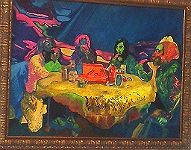The excellent documentary "A Conversation about Race" by Craig Bodeker is no longer available on YouTube. Fortunately, I was able to watch it about a year ago. Since it is an entrepreneurial effort, as well as an educational one, the hour-long $20 DVD is well worth the investment.
The much shorter, and pernicious, video produced by CBC that I discussed yesterday, asks the same questions about racism as does "A Conversation about Race," but never bothers to substantiate the answers (and accusations of racism) as Bodeker valiantly attempted to do throughout his film.
I will try to add some follow-up questions that I think the CBC reporter should have asked to come up with concrete answers, rather than responses based on hurt feelings and emotional outbursts.
The journalist from the CBC comments:
As those numbers [of ethnic minorities] grow, racism still thrives. We visited three communities in Ontario to find out how:I suppose my first question would be to the CBC reporter, to explain what she means by “racism continues to thrive,” and if she could show me actual numbers and statistics to support that statement.
Here are some of the responses she received for her question on how racism thrives, and I add my follow-up questions:
First black man: How to talk about it is not so easy or obvious.
KPA: I think it is very easy. Here is a simple question: can you give me specific examples where someone, or some people, have been racist towards you?
Second black man: You have to be at least two times as good as the other people around you, or you're not getting the job. You're not going to be placed if you're equal.
KPA: Has this happened to you or to someone that you know? Have you, or people that you know, been refused jobs and you thought it was because you were black and merely equal to, and not twice as good as, your white competitors?
KPA: Just another question. In your current job, do you think you were twice as good as your white competitors who didn't get the job? How do you know? Did your boss specifically tell you?
Muslim woman: The secretary at my school once told me to take off my earrings because they looked like planes that are about to take off.
KPA: That does sound annoying. Maybe she had bad memories of 9/11, and didn't like anyone wearing earrings that look like planes that might crash into buildings. Can you give other examples of racism towards you?
Third black man: Professors look at you like "do you really know what you're talking about?"
KPA: They just look at you, and you get that impression? Has any professor ever said to you that because you are a black student, you don't know what you're talking about?
And the focus of the report, Toronto teacher Kurt Moss, who, according to the CBC reporter, has been plagued by racism all his life, talks of his first incident of racism.
Kurt Moss: Me and a group of friends, mostly black males, were crossing the street. And someone who was crossing the street as well they (sic) said, "Get out of the way you niggers." That's when I realized, recognized, that this is a huge issue.
KPA: Has anyone ever called you a nigger, or any other derogatory name, since that first incident? And if not, how do you detect people's racism towards you?
The CBC reporter let everyone off the hook. They all felt racism, they perceived racism, they were annoyed, irritated and frustrated by some of the ways they were treated, but none of them produced any concrete examples of actual racist incidents other than Kurt Moss.
And Kurt Moss is now the champion anti-racist teacher-activist in the Toronto school system, all based on one, single incident probably about ten to fifteen years ago, which he is still traumatized by and which he simply won’t let go of. If I were of a truly cynical nature, I would say that this incident has become his goose which lays the golden eggs, sustaining his job, his activism and his life. Racism, or crying racism, can be a very lucrative business.
To watch the short video, you can go here to the CBC's The National site. The video is called, "Tolerance: Canadian Voices."





